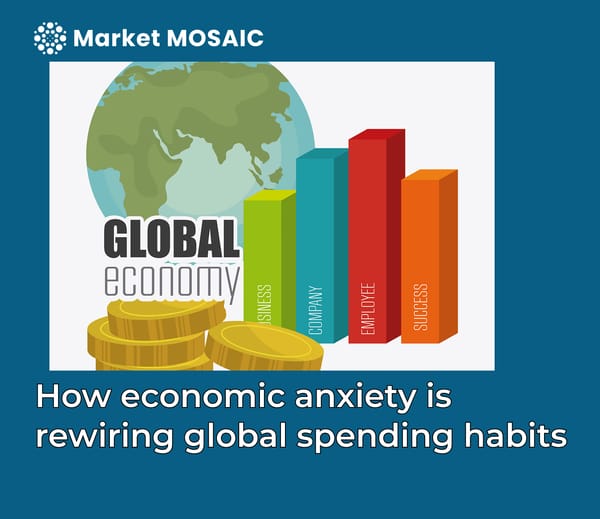Leveraging Consumer Insights to Enhance Customer Experience.

Understanding the Link Between Consumer Insights and Customer Experience
Understanding your customers' needs, wants, and pain points is an essential step towards enhancing the customer experience. With the aid of insightful consumer take, derived from innovative and precise research methods, a business can map out an entire customer journey, meeting their target at their point of need. This dedicated process not only puts a wealth of data about consumer sentiment, behavior, and desires at the fingertips for review but equips the business to craft strategies that reach the clientele authentically. Therefore, it substantially increases the possibility of converting these consumers, who are now more informed through the process, into promoters with a higher customer lifetime value. Already neck-deep in this competitive world, companies, whether seasoned or budding, would need to implement such comprehensive strategies to tower above the competition.
Using Consumer Insights to Elevate Customer Service
Customer service can greatly benefit from the application of consumer insights. By tapping into sources like customer feedback and service data for valuable insights, businesses can fine-tune their services to meet customer needs, akin to how Wayfair improved their app based on insight that a large portion of their customers place orders via mobile devices. Such knowledge allows businesses to foresee and promptly address issues, minimizing the case for customer complaints while boosting satisfaction. Moreover, offering professional training to staff, backed by these insights, can align service delivery with the customer's expectations—creating richer customer experiences shown to increase repeat shopping.
This strategy is still gaining momentum in the business world; like the case of Very, they use personalised messages based on sign-in information and seasonal data to make a more intimate connection with the visitor, a move that has been successful in enhancing brand loyalty.
Impact of Effective Consumer Insight Usage on ROI
Organizations that leverage customer insights effectively experience an 85% increase in sales growth compared to their peers, according to research by Microsoft. Moreover, utilizing quality data for deep, driven data insights into customer behaviors can lead to substantial financial benefits. A striking illustration of this is the surge in revenue produced by businesses that prioritize improved customer care and device use for a better overall experience. In fact, a moderate increase in quality consumer experience, primarily piloted by the adept application of consumer insights, contributes to an average revenue increase of roughly $775 million over three years for a business netting $1 billion as annual revenues. This highlights just how important knowing your customers, their needs, and their attitudes is in many market scenarios. Clearly, consumer insights and their strategic wield can have an extensive positive effect on return, thereby yielding promising returns on investment (ROI). This is notably striking when viewing a graph depicting statistical correlation between increasing usage of consumer insights and subsequent improvements in ROI Hence, extracting and utilizing this data is an essential imperative and well worth the diligence for any business that aspires to expand its range, get to know their customers better, and amplify the love they have for their brand.
Deciphering Consumer Insights with the Aid of Technology
AI and its Implications on Consumer Insights in 2024
Artificial Intelligence (AI) is set to revolutionize the way consumer insights are gathered and used in the immediate future. Synthesizing AI's capabilities with data research and research data analytics, we are opening new paths to foresee the industry trends and anticipate customer behaviours. Indeed, AI is becoming a powerful, industry-leading tool in discerning shopper preferences, rendering it invaluable in the retail sector. By weaving insights into this narrative, we can tell a compelling story of predictive analytics' power to facilitate trend detection, customise marketing, and supercharge customer engagement.
Drawing from McKinsey's latest research, there is a promising forecast that companies integrating AI into their consumer insights processes can expect a revenue lift between 6-10% by 2024 - a potential new market that matters a lot for businesses.
Thinking about it for too long might cause a missed opportunity, hence organisations should consider taking advantage of AI to stay ahead and remain at the top of their game.
Strategies for Incorporating Consumer Insights in Business Setup
Tips to Make Consumer Insights a Part of Your Strategy
Making consumer insights an integral part of your strategy is crucial for business growth. Leveraging a combination of transactional, observational, and behavioral data, the efficient management of data collection processes could unearth vital social consumer insight. By utilizing different platforms like social media, surveys, and CRM systems, you gather a holistic view of your customers' activity (1).
Analyze and Interpret the Data: Beyond merely gathering data, it's pivotal to manage your collected data by using AI-based analytics tools. This practice will help you decipher patterns, preferences, and trends, sparking key business decisions. Recognizing which promotions appeal to your audience, for instance, could increase your operating margins significantly (2).
Consider integrating insights from data interpretation into your decision-making process regularly. Doing so allows you to apply review insights to guide strategic decisions, such as the launch of targeted marketing campaigns or the development of new products that cater to current consumer desires (3).
Establish a consumer-centric culture within your business. In doing so, you emphasize the importance of consumer insights across many departments in your organization. This cultivates a management strategy that mirrors real people, driving more targeted, much-needed change and growth (4).
Consumer behavior can change rapidly; hence, the iterative management of insights is a vital observation. To stay relevant, make sure to update your consumer insights regularly. This will reflect current realities and aid your strategic response effectively, helping you to anticipate consumer needs before they even arise (5).
Importance of Consumer Insights in Business
The importance of consumer insights in business cannot be overstated. It lies at the heart of successful marketing, product development, and customer service strategies, serving the actionable customer needs that play a significant role in shaping the business.
- Customer Retention: Utilizing consumer insights promotes customer-centric services, leading to higher customer retention rates. The insights work by studying customers' needs, identifying their preferences, buying history, and key data one can implement strategies based on this critical information.
- Strategic Marketing: Insights can aid in crafting personalized marketing strategies that both boost engagement and improve conversions in various demographics. These connected insights effectively answer the consumer's needs fostering a communication that resonates with them.
- Product Development: Knowing what customers want and need can guide product development, ensuring you deliver products that meet market demands. The need for actionable customer insights helps identify certain preferences, providing the roadmap for such development.
- Competitive Advantage: An insightful understanding of your customers, attained through detailed consumer insights reports, can give your business a competitive edge. Knowing your customer's needs and acting upon them first gives you a vantage point against competitors.
- Improved ROI: As seen earlier, the need for consumer insight is justified by the substantial increase in ROI it can bring about. This story is often told through the sustained growth of businesses that implement actionable insights effectively.
How to Begin With Consumer Insights Research?
Embarking on the journey of consumer insights research is a strategic move for any business. This process can reveal meaningful insights about your consumers' habits and preferences. Here's how to buy into this pattern of operation:
- Define Your Goals: Understand what your main objectives are and what you want to learn about your consumers.
- Identify Your Resources: Determine what tools you got at your disposal. Think about who will collect and analyze the data, and how much time you can dedicate to the process post-planning.
- Choose Your Method: Decide how you'll collect data that are helpful. Will you use surveys, focus groups, or social media analytics as a part of your research? Each method has its major benefits.
- Plan Ahead: Understand that the awareness of consumer preferences that you gain should be utilized effectively. Think about how your strategy may change as a result of the insights you gather and formulate several solutions to potential challenges.
- Get Started: Once you've planned, it's time to delve into the exciting world of consumer behavior. Start collecting and analyzing data.
Each business will have a unique approach to consumer insights research. Remember, this research is not a one-time process but a continual cycle of learning to drive meaningful engagement with your audience.
Final Thoughts and Future Directions
The Continued Importance of Consumer Insights in a Digitally Dominated World
In a digitally dominated world, consumer insights continue to deliver significant value to organizations. Whether it's a day-to-day operation or a strategic marketing campaign, understanding your customer's behavior, preferences, and purchase triggers can significantly elevate company performance. It's a fact asserted by Jamie Robinson, Global Research, and Insight Director at WeAreSocial. He emphasizes that these valuable insights can be garnered through a few impactful sentences, unraveling copious data from social data to sale data.
With the increasing ubiquitousness of digital mediums, businesses, like the global brand 3, have an unprecedented opportunity to discover consumer tendencies. They can find out whether a new product segment will resonate with their audience or what time of the day their customers are most likely to talk about their product online. Consumer insights, empowered by digital channels, allow businesses to tailor their products, services, and customer interactions in line with individual customer needs. This level of personalization enhances customer satisfaction and loyalty and gives businesses a competitive edge in this increasingly interconnected and global market.
Businesses must always leverage consumer insights gleaned from digital channels not just to stay afloat but also to thrive in their respective market area. They can effectively identify avenues for growth, increase sales, and focus on customer retention. It's all a matter of spotting the insights that matter in the vast sea of data and turning them into actionable steps for company success.
What Does the Future Hold for Consumer Insights?
The future of consumer insights is promising, with technology playing an ever-increasing role. Test groups and analyzing customer feedback will further shape this evolution, ensuring businesses stay relevant. As technological landscapes constantly shift and evolve, the last thing we might expect is stability. However, one consistent factor is the pivotal role of consumer insights in defining the future.
- AI Revolution: Integrating AI is set to revolutionize how insights are collected and used. They're potentially game-changing - predicting a 6-10% potential increase in revenues by 2024 for companies leveraging AI. Never before has the artificial intelligence boon felt so real.
- Real-time Insights: Advancements in technology mandate a shift towards businesses finding and utilizing consumer insights in near real-time. The last thing any brand wants is to miss out on swift adaptation.
- Data Privacy and Security: With the increasing global ubiquity of data use, there's a necessity for flexibility, especially when handling sensitive data. There will be a greater emphasis on data privacy and security, with everyone from the consumer to the authorities demanding transparency in how their data is utilized.
- Hyper-personalization: Increasingly sophisticated data will enable brands to hone unprecedented levels of personalization in their customer engagement. This level of detailing might prove key in finding consumer insight and shaping unique user experiences.
The key to success in this rapidly morphing landscape is maintaining adaptability and remaining open to take advantage of these emerging trends.





